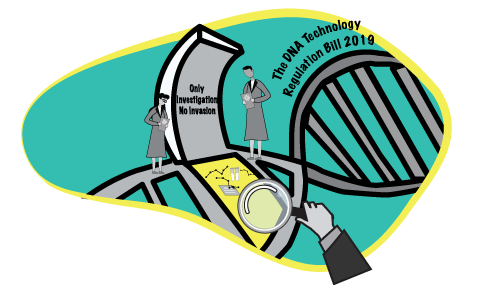The DNA Technology (Use and Application) Regulation Bill 2019

Deoxyribonucleic Acid (“DNA”) is a chemical name of the molecule that carries genetic instructions in all living things. The DNA of each person is unique. As a result, DNA technology can be used to accurately establish the identity of a person. In criminal investigation, it is used as the ultimate test in confirming the identity of a person – offender and the victim.
In July 2019, The DNA Technology (Use and Application) Regulation Bill – 2019 was introduced in the Lok Sabha. It was then referred to a Parliamentary standing committee for science & technology for its review and recommendations. Recently the standing committee submitted its comments / suggestions. In this context, a look at the Bill.
Highlights
1. The Bill was introduced recognizing the need for regulating the use of DNA technology in criminal investigation – establishing the identity of person(s), missing persons, victims, offenders and potential offenders. This could be useful in solving cases of a varied nature – criminal, civil cases such determining parents or children of person(s) etc.
2. The Bill seeks to establish:
a. Data Bank(s): A national DNA data bank and regional DNA data banks. Such data banks have to maintain index of suspects, undertrial, offenders, missing persons, unknown deceased persons and related information..
b. Regulatory Board: The Board shall comprise of members from biological sciences, forensics, finger printing, CBI and NHRC. It shall provide accreditation to every DNA laboratory that analyses DNA to establish identity of person(s). Such accreditation shall be valid for 2 years. The Board may revoke such accreditation on failure by the labs to comply with certain conditions. Besides, the Board shall also organize and undertake training programs.
3. DNA Laboratories shall collect the DNA samples, prepare the DNA profiles, and then share them with the data banks. The Data banks shall store such data. They shall be governed by the DNA regulatory Board in this regard.
4. Written consent is required from the person whose DNA sample is sought for testing. However, this consent is not required from persons whose offences attract imprisonment of 7 years or more or death. Similarly, written request is required to remove the DNA profile from the indexes especially those of suspects found in the crime scene and missing person index.
5. Cross matching is proposed between those who are reported missing and unidentified dead bodies. This will help especially in situations of mass disaster – Tsunami, floods, terror activities such as 9/11.
6. The Bill contains a Schedule with a list of civil matters where DNA profiling can be used.
Criticism
- The Bill has been criticized essentially on the ground of invasion of privacy. It is seen as gross violation of human rights. Since the right to privacy law is still at nascent stage, there is no legal remedy for invasion of privacy. It is open for misuse or abuse of such data.
- There is fear of misusing the DNA data for profiling for incorrect purposes – gender profiling, cast and community-based profiling etc. for unlawful purpose or with the intent to disturb the peace and social security of the nation.
- The Bill expressly contains establishing DNA data banks and Regulatory Board to govern them. However, there is no express mention of process of identifying and regulating the medical / research laboratories that collect and profile DNA samples.
- The written consent required from persons for taking their DNA samples may not be voluntary. It could be given on coercion or threat.
The DNA bill seeks to effectively use technology in DNA analysis and strengthen the delivery of justice especially in criminal and civil matters. In February 2021, the parliamentary standing committee submitted its recommendations to the Parliament. The Parliament will have work on providing a concise legislation on an extremely sensitive issue. For there is a thin line of difference between investigation and invasion.

